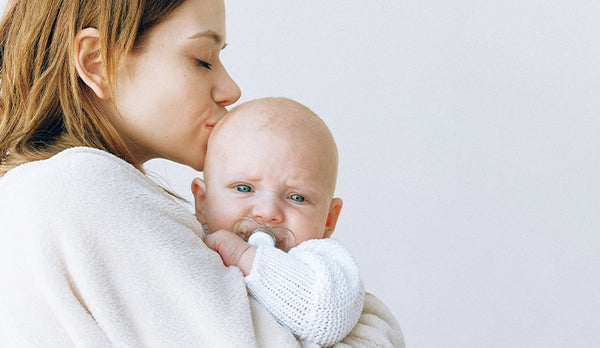
Having a baby is a very emotional experience. It is a time of excitement, joy, and eager anticipation, but can also be filled with feelings of overwhelm, sadness, frustration, or loneliness. All of these emotions (and many more) are normal, common experiences for moms who have recently given birth. Between sleep deprivation, fluctuating hormones, and the overwhelm of having to care for a new life, you may find yourself on an ever-evolving rollercoaster of emotions.
You may have pictured having a new baby as a time filled with smiles and snuggles, but instead find yourself crying easily and feeling sad. You may wonder, “Is it normal to cry like this after having a new baby?” And while the answer is yes, it is important to understand the differences between the symptoms of the baby blues and postpartum depression.
What Are the “Baby Blues?”
Research has shown that as many as 60-80% of moms experience what is called “the baby blues.” Typically, symptoms associated with the baby blues last between two days and two weeks after giving birth. While it may feel unsettling to cry so easily, this is not an indication of a mental health concern. The baby blues are a result of hormones fluctuating after giving birth as well as the physical exhaustion of labor and sleepless newborn nights.Symptoms of the baby blues include:
- Tearfulness
- Rapid mood swings (happy one minute to crying the next)
- Reactiveness
- Exhaustion
With the baby blues, you still are generally happy. Though you may cry at a song playing in an ad for the latest teeth whitener, overall, you still experience and feel joy. And with the baby blues, your self-esteem doesn’t tend to be impacted. It is important to remember that if you are experiencing these symptoms within two weeks of giving birth, this is the baby blues.

What Is Postpartum Depression?
Postpartum depression looks very similar to what you might experience with major depression. However, the difference is that symptoms of postpartum depression show up either during pregnancy or after you deliver your baby. While some of the symptoms of postpartum depression and symptoms of baby blues might seem alike, postpartum depression symptoms are more severe and they last longer than the first two weeks after giving birth.Symptoms of postpartum depression include:
- Depressed or low mood most of the day
- Loss of interest in things you enjoy
- Changes in your weight or appetite (increase or decrease)
- Changes in your sleep
- Feelings of worthlessness
- Loss of energy or fatigue
- Struggling with concentrating or focusing
- Reoccurring thoughts of self-harm, death, or suicide
Talk with your OB-GYN about how you feel.
Let your provider know how you have been feeling and thinking. She may or may not recommend medication to help with some of the symptoms, but she will definitely want to make sure you have the help and support you need.Share with your family, support person, or spouse how you have been feeling.
You may not know what you need from them, but having them there to be supportive of what you are going through is so important. Often women worry about telling others that they feel sad after having a baby because they believe “I’m not supposed to feel this way” and worry what others will think. But postpartum depression is common and there is nothing to feel shame about.Reach out to an online counselor who specializes in postpartum depression.
Motherhood can be very isolating and is so challenging, and having a professional to talk to can help. Postpartum Support International is a wonderful organization that has a directory of therapists and counselors around the country who have gone through specific training to specialize in working with women who are experiencing postpartum depression. The directory can help connect you to either an in-person counselor or an online therapist in your state.
About Ashley Comegys
Ashley Comegys is a licensed clinical social worker and helps women with anxiety navigate life transitions, grief and loss. She has an online therapy practice where she specializes in working with moms who are experiencing anxiety or depression, military spouses , and women who are experiencing postpartum anxiety or depression. Ashley is licensed in the states of Louisiana, Hawaii, Colorado, and Florida, where she currently lives with her husband and two little boys.
DISCLAIMER: Content on this site is not a substitute for professional medical or healthcare advice, diagnosis, treatment, dietary, or safety advice, and may not be used for such purposes. Always seek the advice of your physician or other qualified expert with any questions you may have regarding a medical question, condition, or safety concern. Reliance on information presented on this site is at your own risk. This site contains the opinions and views of others and does not represent the opinions and views of Noodle & Boo, LLC. Given the interactive nature of this site, we cannot endorse, guarantee, or be responsible for the accuracy or efficacy of any content generated by our users or bloggers.










Leave a comment